Training the Virginia Department of Criminal Justice on how to support survivors of FGM/C

On August 8th, Sahiyo hosted a training for the Virginia Department of Criminal Justice, titled “Cross-Collaborative Work: Incorporating Female Genital Mutilation/Cutting Survivors into Support Services in Virginia.” Even with growing recognition of FGC in the U.S., many service-providers, including law enforcement, are not adequately equipped to address FGC in the United States. This training provided an introductory foundation for an understanding of FGC, as well as the role the legal system and victims advocates have in addressing and responding to this issue. In addition, the training addressed key competencies and best practices for working with and interacting with survivors of FGC and/or practicing communities. This training was attended by 60+ members of the Virginia Department of Criminal Justice Services, including victims advocates, researchers, law enforcement, legal services, healthcare providers, and others.
Building a NASW approved trainings for Social Workers
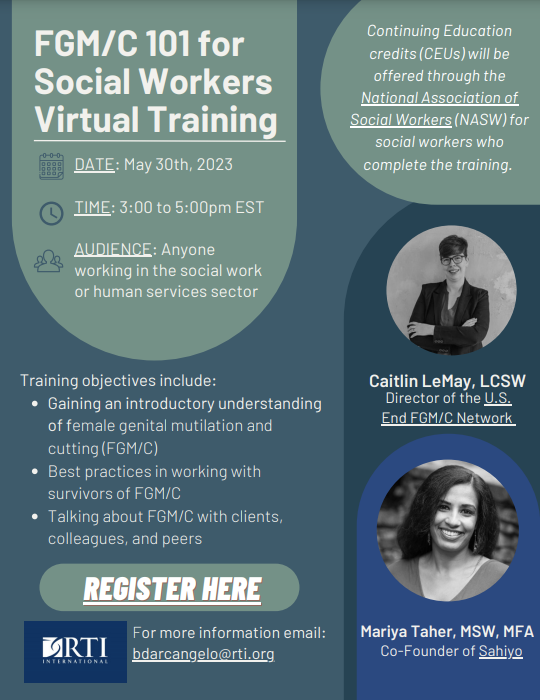
On May 30th, RTI International hosted a training for social workers on female genital cutting (FGC). Recognizing that many first responders and clinical providers in the U.S. are not adequately equipped to address FGC in their practice, this training provided continuing education units for licensed social workers. The training provided an introductory foundation for understanding what FGC is, including its prevalence in the U.S. and globally, and best practices for working with survivors of FGC. Overall, the workshop sought to increase attendees’ confidence in talking about and addressing FGC in their practice and provided resources to build further knowledge on the topic.
Training the Prince George’s County Health Department on FGC
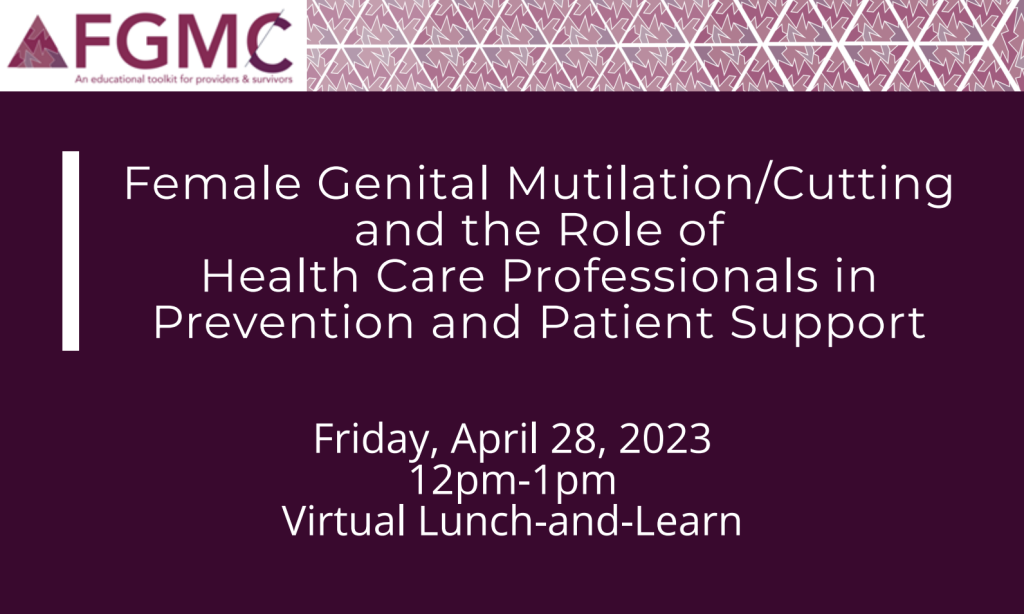
On April 28th, Karen McDonnell, Associate Professor at George Washington University’s Milken Institute School of Public Health partnered with Sahiyo Cofounder Mariya Taher to provide a training for nearly 70 health care providers at the Prince George County Health Department on female genital cutting (FGC) and the role of health care professionals in prevention and patient support. Health care providers are important first-responders when it comes to servicing those impacted by FGC, and there is an ever demanding need for culturally cognizant and sensitive training for health care providers in the U.S. This training provided information on the impact of FGC in the U.S. along with practical guidance on how to work with survivors. Resources such as GWU’s Educational FGM/C toolkits for providers were also shared.
FGM/C 101 for Social Workers Virtual Training
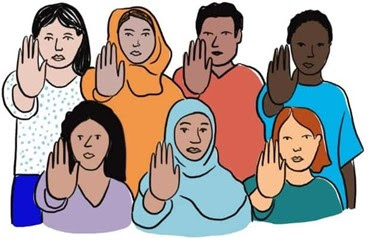
On May 30th, RTI International will hostg a virtual workshop to educate those in the social work profession on female genital mutilation/cutting (FGM/C). This workshop, approved by the National Association of Social Workers (NASW) and available for continuing education units, will provide an introductory foundation for understanding what FGM/C is, including its prevalence in the U.S. and globally, and the role of social workers in addressing and responding to this issue. In addition, the workshop will share key competencies and best practices for working with survivors of FGM/C. Workshop Facilitators will be U.S. Executive Director Mariya Taher, and U.S. End FGM/C Network Director Caitlin LeMay. Event Details:Date: Tuesday, May 30thTime: 3-5 pm ET Register for the virtual event here.
Training and Technical Assistance
Training and Technical Assistance Sahiyo offers training and technical assistance (T&TA) to educate and build the capacity of service providers and front-line professionals on female genital cutting (FGC). Our programs target gender-based violence organizations, law enforcement, educators, social workers, healthcare and mental health practitioners, as well as others. Through these training sessions, organizations are able to better incorporate culturally responsive programming on FGC into their work. To schedule a training session, please fill out our Community Presentation Request form and email us at info@sahiyo.org. REQUEST PRESENTATION What We Offer 1 Learning about Female Genital Cutting for Healthcare and Social Services Providers in the U.S.: This training equips healthcare and social service providers with the knowledge to address FGC, a prevalent yet often hidden practice. It delves into the physical and emotional impacts, the silence surrounding it, and the importance of data, enhanced research, and community engagement. These trainings explore how FGC intersects with other forms of GBV and provide strategies for how healthcare and other social service providers (law enforcement, social workers, and mental health professionals) support individuals impacted by FGC. 2 Sensitively Reporting on Female Genital Cutting – Media Training: This training teaches journalists to report on FGC with sensitivity and accuracy. FGC is a complex issue requiring nuanced coverage that respects survivors and communities. The session addresses common misrepresentations, the risks of sensationalism, and the harm to survivors and the movement. Those engaged in media will learn how to act as agents of change, ensuring survivor safety and responsible reporting. 3 Treating Survivors of Female Genital Mutilation & Cutting: A Culturally Responsive and Trauma-Informed Approach: This training addresses the gap in knowledge among mental health providers regarding FGC. It covers the procedures, the consequences, and the cultural perspectives on FGC. Participants will gain insights into the physical, psychological, and psychosocial impacts and learn culturally responsive and trauma-informed approaches to support individuals impacted by FGC. Past Training Sessions FGM/C 101 For Social Workers Training Hidden Scars x Sahiyo: Practitioner and Advocate Training Case Study: Supporting Asian Women’s Shelter to implement services supporting FGC survivors In January 2022, Sahiyo began working with Asian Women’s Shelter (AWS), a domestic violence organization based in San Francisco, CA, on a three-year project funded by the Department of Justice – Office of Victims of Crime to increase the capacity of care for survivors of FGC in the United States. For eight months, Sahiyo has provided a series of in-depth, interactive trainings to AWS staff, volunteers, and crisis line volunteers about FGC, the mental and physical health consequences of this harmful practice, and how to best support survivors. As a result, Asian Women’s Shelter was able to expand the capacity of the crisis line to include supporting survivors of FGC in August 2022. The goal of this collaborative pilot project between Sahiyo and AWS is to address gaps in resources for underrepresented populations of survivors in the U.S. who are in need of support services, in order to reduce the harms of FGC. “I was so happy to know that Sahiyo is collaborating with the Asian Women’s Shelter to support women who suffer from trauma of FGC and need an empathetic ear. I have worked in the domestic violence (DV) space for a couple of decades, and this is the first time I am seeing a recognition of this trauma in the sphere of DV. I am so proud of both organizations and hope collaboration expands with other organizations throughout the U.S. and abroad.” – Sakina Sharp, Sahiyo Advisory Board Member Hotline Operator: San Francisco Asian Women’s Shelter Number: 1-877-751-0880 Hours of Operation: Monday – Friday, 9:00 AM – 5:00 PM PST Pilot Project Poster design by Sarrah Hussain on training effectiveness of gender-based violence advocates on FGC Learn more: The impact of integrating FGM/C within domestic violence support services by Sarrah Hussain Current Projects Involving T&TA Implementation of Washington State FGC Legislation to Protect Children Following the enactment of Washington’s Senate Bill 5453, signed in April 2023 to address female genital cutting (FGC), the Washington State Department of Health awarded Sahiyo, and co-applicants, Mother Africa and the U.S. End FGM/C Network, a contract to guide the implementation of Section 6 of the legislation, focusing on prevention and support for survivors. T&TA Objectives: Training Development: Create specialized training programs for state agency staff, community members, healthcare providers, and other stakeholders. Stakeholder Engagement: Equip stakeholders with the necessary tools and knowledge to prevent FGC and support survivors. Capacity Building: Provide expert-level consultation and coordination to ensure culturally competent practices. This initiative aims to empower Washington’s strategy against FGC with well-informed, culturally competent practices, potentially setting a benchmark for similar legislative efforts nationwide. For more information, visit the project’s website and watch the Year 1 video recap. Department of Justice’s Office on Violence Against Women (DOJ- OVW) TA Award Sahiyo, in partnership with the Milken Institute of Public Health, Global Woman Peace Foundation, and the US Network, received a $300,000 grant from DOJ OVW to provide training and technical assistance (T&TA) focused on the prevention and response to female genital cutting (FGC) to community-based organizations across the U.S. working to end violence. T&TA Objectives: Training Development: Design and implement specialized training programs for diverse stakeholders, such as healthcare providers, social workers, and community leaders, to prevent and respond to FGC. Create Public Awareness Materials: Develop comprehensive resources, including self-assessments, intake forms, and safety planning guides. Build an Online Repository: Establish an easily accessible online platform to house all developed resources on FGC. Conduct Webinars: Organize webinars on FGC-related topics to improve understanding and skills to effectively address FGC. Host Listening Sessions: Facilitate sessions to gather input to inform and refine training programs and resource development. Support Our Training and Technical Assistance Program
Sahiyo collaborates further with Asian Women’s Shelter to support Survivors
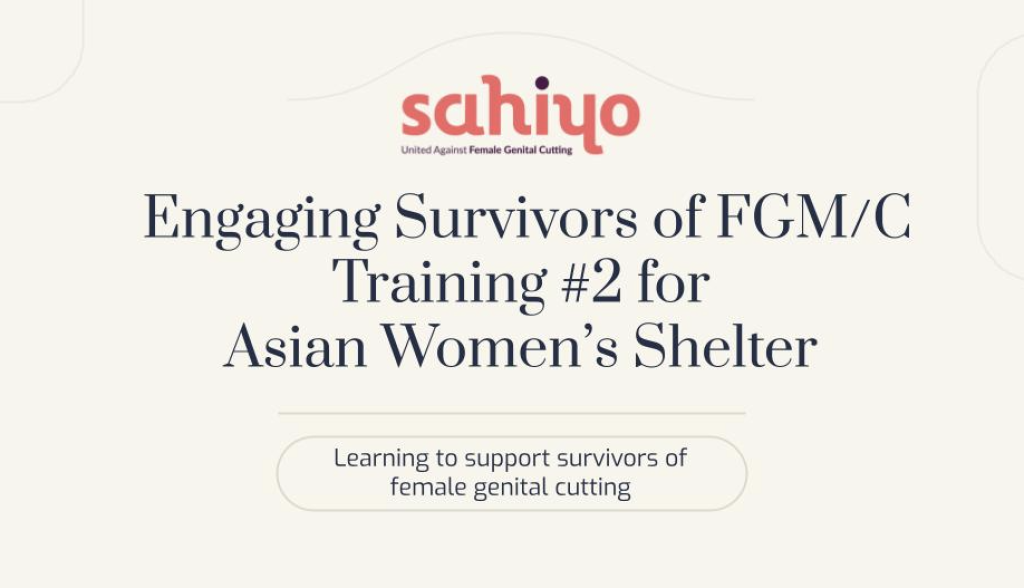
Since January 2022, Sahiyo has been in collaboration with Asian Women’s Shelter (AWS) to increase capacity of services for survivors of female genital cutting (FGC). In June, Sahiyo conitnued with trainings on FGC for the AWS staff and volunteers to help educate their organization on the context of FGC in the United Stataes, who FGC impacts, and considerations around how to work with survivors and communities impacted by FGC. Asian Women’s Shelter is 501c3 with the mission to eliminate domestic violence by promoting the social, economic and political self-determination of women and all survivors of violence and oppression. AWS is committed to every person’s right to live in a violence-free home, and has a specific focus towards addressing the cultural and language needs of immigrant, refugee, and U.S.-born Asian and Arab women and their children. These trainings organized by Sahiyo are part of a larger 3-year project Sahiyo is undertaking in partnership with AWS and StoryCenter withfunding from the Department of Justice – Office of Victim’s of Crime , to better integrate FGC into mainstream and culturally specific gender-based violence prevention and support organizations in order to bolster overall support and capacity of care for survivors of FGC within the United States. Read more about AWS trainings.
Sahiyo hosts Asian Women’s Shelter training

On March 24th, 2022 Sahiyo hosted an inaugural training on female genital cutting (FGC) for Asian Women’s Shelter staff and their crisis line counselors who operate their hotline for have undergone or experienced domestic violence or sexual assault. This training created by Sahiyo provided a basic overview of FGC, including what it is, who it occurs to, why it occurs, and the negative health and social repercussions connected to FGC. Additionally, how FGC impacts communities in the United States was examined and discussed. This training is part of a larger Sahiyo initiative to integrate knowledge of FGC into larger gender-based violence prevention services across the United States to better support survivors of female genital cutting. To learn more about the project, visit here.
Connecticut Trauma and Gender Learning Collaborative Training Part 2
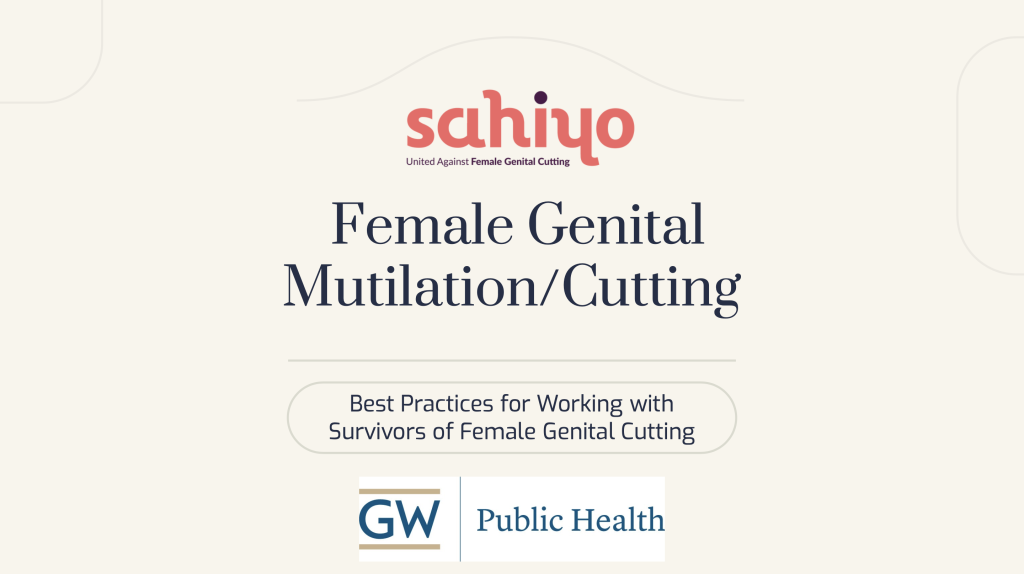
On February 3rd, Sahiyo Co-Founder Mariya Taher joined Dr. Karen McDonnell from George Washington for our second training for the Connecticut Trauma and Gender Learning Collaborative (TAG). TAG is a collaboration between the Department of Mental Health and Addiction Services (DMHAS), the Connecticut Women’s Consortium (CWC), and other healthcare providers in Connecticut. TAG aims to promote best practices in trauma-informed, gender-responsive behavioral health care in Connecticut by providing training, consultation, and information to behavioral health agencies across the state. During this presentation, Sahiyo continued to explore FGM/C in the United States, and discussed various resources available for clinicians and other front-line professionals who may come in contact with women impacted by FGC, and are looking to better understand how to provide trauma-informed care while practicing cultural competence and sensitivity.
Sahiyo leads training for Sexual Assault Nurse Examiners
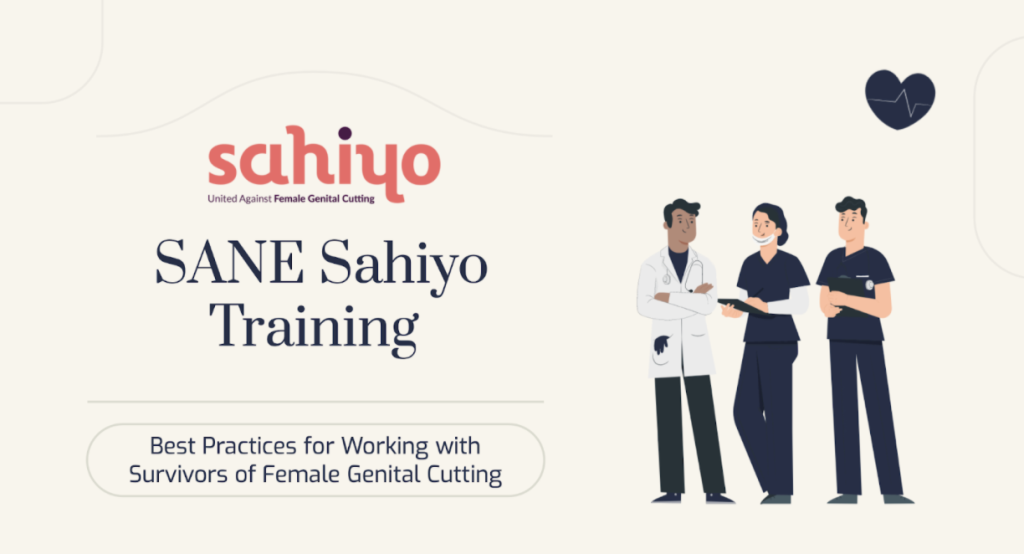
On November 9th, Sahiyo team members volunteer Zahra Qaiyumi, Programs Intern Sarah Boudreau, and Programs Coordinator Cate Cox led a training for Massachusetts based Sexual Assault Nurse Examiners (SANEs). SANEs are registered nurses who have completed additional training and education to provide comprehensive healthcare to those who have experienced sexual assault. As an extreme form of gender-based violence, knowledge about and awareness of Female Genital Mutilation/Cutting (FGM/C) is integral to the care that SANEs provide. During the event, Sahiyo provided much needed education to over 200 participants in virtual attendance. Topics discussed included defining FGM/C and its clinical consequences, the legal context of FGM/C both locally and nationally, and an interactive discussion about best practices for providing healthcare to survivors utilizing the Voices to End FGM/C digital storytelling project. Participants were active in the discussion, recounting times when they encountered survivors of FGM/C in a clinical setting and how those interactions could have been improved. They also self-identified gaps in their own knowledge of the practice, including timing of deinfibulation in pregnancy and how to perform a pelvic exam on someone who has experienced infibulation. Cultural humility-based training of healthcare workers who come in to direct contact with FGM/C survivors has the potential to improve the quality of life of survivors, improve access to appropriate healthcare and potentially prevent the practice in future generations. We also shared some of Sahiyo’s resources, including our Trauma Series Blogs and the Mumkin app. As an organization, Sahiyo hopes to participate in more events like this and continue to evolve training content to fit the needs of survivors and the individuals providing them care.
Practitioner and advocate training: Best practices for working with survivors of gender-based violence
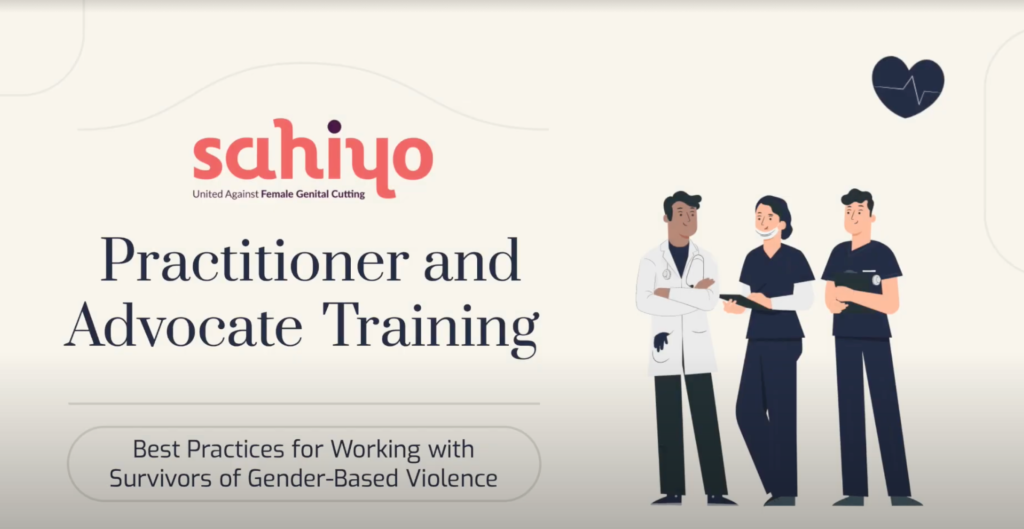
In June Sahiyo partnered with Hidden Scars to host training for practitioners and advocates working with survivors of gender-based violence (GBV) and female genital cutting (FGC). Gender-based violence (GBV) is a reality for many women and girls. The World Health Organization reports that one in three women will experience sexual or physical violence in her lifetime. Yet, GBV often remains hidden and shrouded in silence and shame. At the core of providing better prevention, protection, health, and social support services for women and girls are stronger data, enhanced research, and community engagement. Our presentation explored how practitioners can provide trauma-informed care to survivors of GBV, using FGC as a case study. We also provided resources for clinicians and other front-line professionals who may come in contact with women impacted by both, and who are looking to better understand how to provide better care. While Sahiyo’s expertise is in addressing FGC, we acknowledge that FGC is a form of gender-based violence and child abuse. Our team felt that many of the lessons that can be learned about how to help survivors of FGC could also be applied to all forms of GBV. Like other forms of gender-based violence, such as domestic violence, FGC is a learned behavior of childhood, and is often surrounded by a culture of silence and shame, and is a form of generational violence. However, GBV can also include childhood marriage, rape, sexual assault, honor crimes, domestic violence, and other crimes against women. While we used FGC as a case study, our goal was to create training that would allow practitioners to provide better care to all survivors of gender-based violence. [youtube url=”https://www.youtube.com/watch?v=nya-MMeAlJ4″] During this event, we provided an overview of FGM/C and GBV, as well as shared videos from our Voices to End FGM/C project. These videos helped our audience better understand the complicated emotions and experiences survivors go through, and to begin to think about how they as providers can better support them in their journey toward healing. We also shared tools such as the George Washington University FGM/C Toolkit, Mumkin, and other resources that are available to help them and their organizations think about how to provide better care to survivors. Finally, in order to facilitate conversations and help our guests practice communicating with survivors, we also hosted mock conversations. These conversations were held with the goal to help practitioners become more comfortable speaking with survivors and to practice having productive conversations with patients. We strongly encourage anyone who works in healthcare or provides direct services to survivors of GBV or FGC to watch the recording of this event on our YouTube page, or check out these additional resources below: Addressing FGC in the Clinic: A Dialogue Between Survivors and Health Care Professionals Diagnosis, Management, and Treatment of Female Genital Mutilation or Cutting in Girls Female Genital Mutilation/Cutting: An Under-recognized form of Gender-Based Violence in the U.S.
